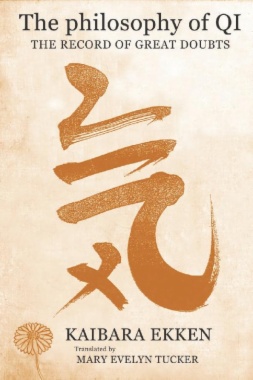The Record of Great Doubts emphasizes the role of qi in achieving a life of engagement with other humans, with the larger society, and with nature as a whole. Rather than encourage transcendental escapism or quietism, Ekken articulates a philosophy of material force as a basis of living a life of commitment to the world. In this spirit, moral cultivation is not an isolated or a self-centered preoccupation, but an activity that occurs within the dynamic forces of nature and amid the rigorous demands of society. In this context, a vitalism of qi is an emergent force, not only providing the philosophical grounding for this vibrant interaction but also giving a basis for an investigation of the natural world that plumbs the principle within things. Ekken thus aimed to articulate a creative and dynamic milieu for moral education, political harmony, social coherence, and agricultural sustainability.
The Record of Great Doubts embodies Ekken's profound commitment to Confucian ideas and practices as a method for establishing an integrative ethical vision, one he hoped would guide Japan through a new period of peace and stability. A major philosophical treatise in the Japanese Neo-Confucian tradition, The Record of Great Doubts illuminates a crucial chapter in East Asian intellectual history.
- CONTENTS
- Acknowledgments
- INTRODUCTION
- Ekken’s Life and Thought
- The Text in the Context of East Asian Confucianism
- Material Force (Qi)
- Zhang Zai's Development of the Concept of Material Force
- The Influence of the Monism of Qi of Luo Qinshun
- Affirmation and Dissent: The Significance of the Record of Great Doubts
- The Text in the Context of Tokugawa Japan
- The Spread of Confucian Ideas and Values
- Tradition and the Individual: The Importance of Dissent and the Centrality of Learning
- Philosophical Debates Regarding Principle and Material Force
- Reappropriating Tradition: Practical Learning and the Philosophy of Qi
- Interpretations of Ekken’s Philosophy of Qi
- Confucian Cosmology: Organic Holism and Dynamic Vitalism
- Confucian Cultivation: Harmonizing with Change and Assisting Transformation
- The Significance of Qi as an Ecological Cosmology
- Notes
- PREFACE
- PART I
- On the Transmission of Confucian Thought
- On Human Nature
- On Bias, Discernment, and Selection
- On Learning from What Is Close at Hand
- The Indivisibility of the Nature of Heaven and Earth and One’s Physical Nature
- Acknowledging Differences with the Song Confucians
- PART II
- Partiality in the Learning of the Song Confucians
- Reverence Within and Rightness Without
- Influences from Buddhism and Daoism
- The Supreme Ultimate
- The Way and Concrete Things
- Returning the World to Humaneness
- Reverence and Sincerity
- Reverence as the Master of the Mind
- The Inseparability of Principle and Material Force
- Notes
- GLOSSARY
- BIBLIOGRAPHY
- INDEX

